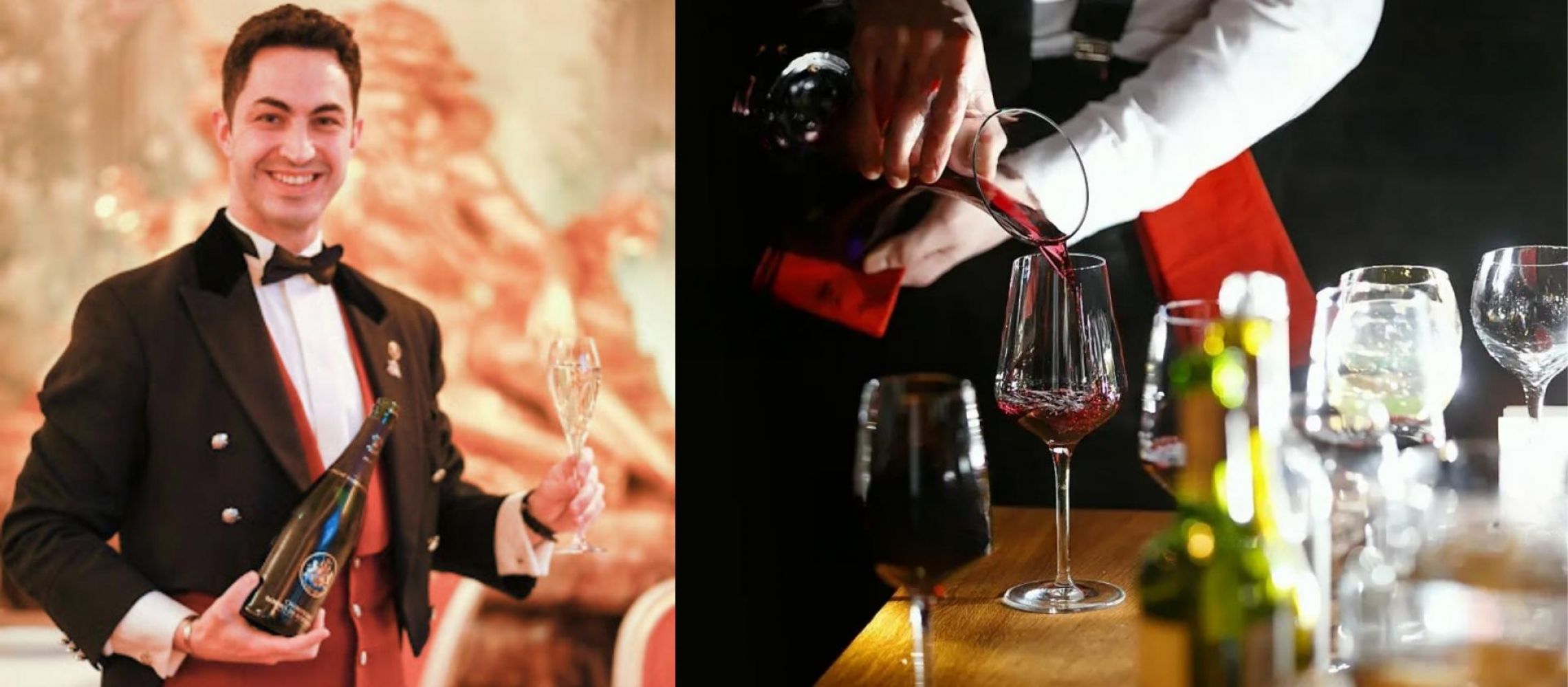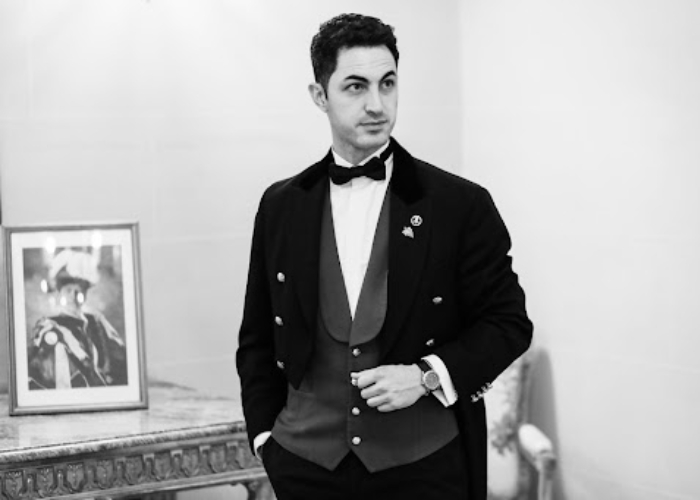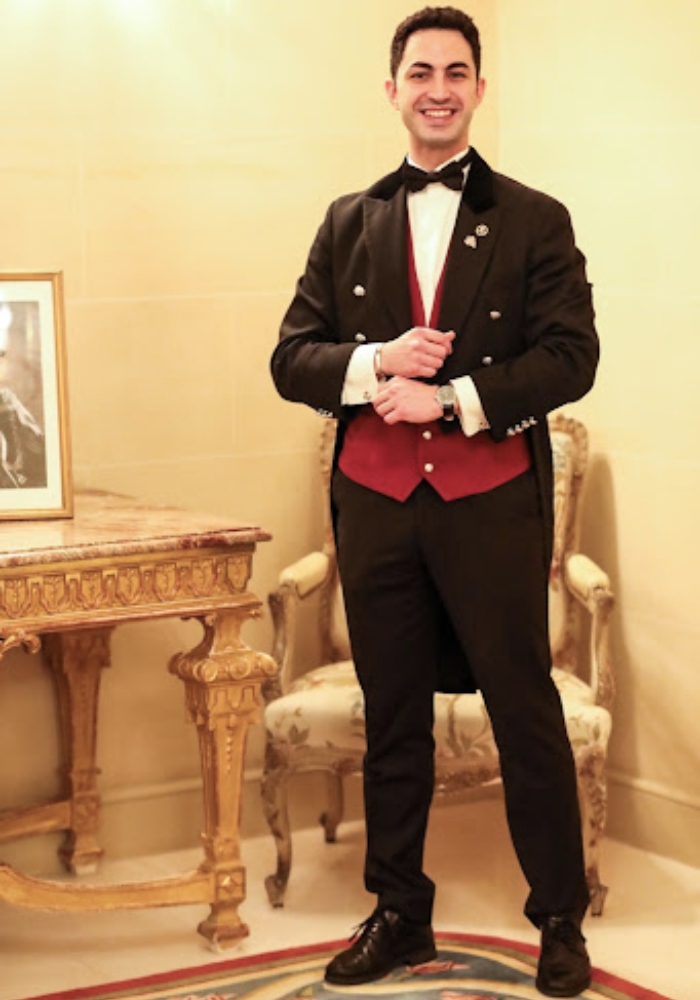Registration Open
1 June 2025
Judging
Date
23 & 24 March 2026
Winners Announcement
22 April 2026
1 June 2025
23 & 24 March 2026
22 April 2026

I am very pleased to introduce myself as Davide Santeramo, born and raised in Cavaria, a small village in the province of Varese in Northern Italy, now working as a Senior Sommelier at The Ritz London. I enjoy everything this wonderful city has to offer, the hospitality industry is ever-growing and provides many exciting opportunities to learn from passionate, dedicated experts in their fields. At first, I was always fascinated with the kitchen and the passion of Chefs. I quickly realised, however, that the kitchen environment was not suited to my outgoing personality, and I craved interaction with guests. I decided to complete a Tourism and Hospitality Management course, which opened the door to the world of hotels and allowed me to work in various front-of-house positions. This inspired me to discover new aspects of the industry and management styles. I moved to London at 22 years old to improve my language skills and I continue to look forward to my future ahead.
My aspiration to become a Sommelier luckily came to be very naturally. I had the fortunate opportunity to see my dear friend, Giorgio Scarsella immerse himself in the life of wine and become an industry leader. Paired with the motivation and mentoring I received from Gino Nardella MS, another legend with lifelong expertise, my passion and desire to become a Sommelier very quickly grew. The vast opportunities and freedom that the wine industry provides are a huge incentive. There are plenty of routes that your knowledge of wine can take you, whether it be as a Sommelier, Export Manager, Wine Consultant, becoming an entrepreneur with your own wine shop or purely investing in wine. Currently, I am thriving as a Sommelier, I enjoy being part of the busy operation of a Michelin-starred Restaurant, but also take pride in working in my smaller Sommelier team with experts.

Image: Davide Santeramo, Senior Sommelier at The Ritz London
Certainly, the knowledge of theory including but not limited to geography, winemaking, grape varieties and styles, history and culture is a vital skill. Knowledge is ever-growing however, and so the control of this will come with continuous dedication to studies, lectures and updates on this vast subject. Another key skill is showmanship. Like all front-of-house staff, we are theatrical at heart and love to entertain the guest, but we also must be incredibly focused and intuitive on assessing the guest’s needs, in an observant, timely manner without being overbearing. This may only happen seamlessly if there is clear communication within a healthy team environment. The ability to maintain strong working relationships must also extend to your suppliers. In addition, you must be able to prioritise, as within a Sommelier’s role there are many admin tasks that must be done behind the scenes, some of them strongly related to service, while others concern the sourcing, listing and stock of the wines in the cellar. Of course, last but not least important is the financial aspect that needs to be taken into consideration prior to and after any decision.
[[relatedPurchasesItems-50]]
I would firstly wish to ensure that the staff member feels safe and comfortable, in order to allow their confidence to shine and open up their ability to take in new information. I would do this by introducing them to the environment and their colleagues, ensuring rota structure and shift pattern is understood and explaining the type of guests we serve and the experience we wish to create so that the new starter is in alignment with our vision. We would then work on skill sets, I would assess the employee’s areas for improvement and target these. I believe hard copy assessable standard operating procedures, task lists and forms are very user-friendly for new starters and are an efficient tool in the induction/training process. When we go into further details with the training, I like to offer an explanation as to why we choose to complete certain methods in such ways to again improve the level of understanding. Throughout, it is very important to receive feedback from the new employee on all aspects of the induction, so that there is clear and open communication, which is vital for a bilateral growing process.
Training:
I think this is one of the most efficient tools of all and one that will inevitably increase wine sales. If the staff feel confident in their knowledge of wines, they will naturally sell with ease and enthusiasm. The more knowledgeable the Sommelier seems, the more trusting the guest will be of them and therefore more likely to take their upselling recommendation. Training is more accessible than many think, often suppliers are very happy to provide training on their own accord. You must plan ahead and ensure training is booked in the diary and that all staff are able to attend.
Incentives/Challenges:
Following a critical sales analysis, you will find which products need a sale improvement. It can be beneficial to create a deal with your distributor who can guarantee quantities at the best price of the wine needed and ask for a prize; this may be a trip to the estate, a voucher for a dinner or simply a bottle/case of that wine. You then need to create the sales challenge for the team and their motivation for said prizes will help them go the extra mile to increase sales.
Tableside service:
Everyone loves a touch of theatre in the dining room and tableside service is the best solution that combines the skills of the Sommelier and at the same time offers the opportunity for potential upselling. Once the guest sees the product in front of them, their desire to have it increases. The same concept can be executed with digestif or decanting.
Diversification of the offer:
I think in order to increase sales we should be able to satisfy any guest request or desire. To do so our wine list should be deep and diverse with different styles of wine at different price levels. An extra sales generator can be found in non-alcoholic beverages, such as an infusion selection, soft drinks, or non-alcoholic wines and beers. In cases where the Restaurant has a tasting menu, the development of both wine and non-alcoholic pairings could help to increase revenue.
Special events:
A wine-orientated dinner can be organised to attract a different guest demographic. The creation of a special menu and a wine selection to go alongside it could become a monthly or weekly event and therefore would build up a community of return guests. Another potential event would be a wine club where people can learn about wine and food pairing and could include a little extra incentive, such as a glass of Champagne.
Of course, the market inflation is challenging us all but there are a few things we can focus on to grow profits. The timing of purchasing is certainly very important; buy in advance and stock wine. This means you are able to purchase the product at a more favourable price. Having a mutual, honest and loyal relationship with suppliers is equally very important. This helps to obtain good prices and also access certain prestige wines that are sold only via limited allocation. The use of "House Wines" can help to achieve lower costs by guaranteeing a high volume of purchases. Another method to reduce cost and increase profit is the stipulation of the medium - long-term listing of certain wines, potentially on the "By the Glass" selection, which usually ensures a higher amount of sales.
Curiosity, Passion, Dedication, Ambition.
I truly believe wine is a beverage that is able to create wonderful experiences with an individual on their own but is also a vehicle that brings people together. I think the part I enjoy the most is the fact that thanks to this job I am always able to meet new people, share stories and know that I have enhanced a guest’s experience. Not forgetting, the very exciting wine dinners and wineries I have the opportunity to enjoy only through working as a Sommelier.

The basics cannot be missed. Any front-of-house role must be welcoming, kind, attentive and efficient. Another very important skill, which I touched on briefly above, is being intuitive. This is vital. Each guest is an individual and must be treated as so, the only way to do this is to assess and adapt your style of service. This all has to be done naturally and through understanding the guests’ reactions to you. This may even change throughout the service and so you must always be ready so that the experience remains fluid and streamlined. This extends further than just your communication style and relationship with the guest. You must be intuitive to know in advance when the guest is expecting service, a refill, their chair pulled, or whatever it may be. The guest should feel as though all their needs are taken care of and the experience has been tailored to them.
I'm not the kind of person that dines in restaurants very often, however the few times I have been to Trivet, in Bermondsey, I always find myself very satisfied with every aspect that a great restaurant should have. The people are very welcoming, the atmosphere is energetic and relaxed at the same time, and the interior design is simple and minimal, which are all elements that I personally like very much. I love the fact that there is an open-view kitchen where guests can actually see how things are prepared and see how the chefs are working hard but very smoothly. It almost appears to be a dance in the kitchen. The wine list is looked after by Isa Bal MS, characterised by a very humble and familiar person despite being recognised among the best in the sector, and always offers great suggestions for an interesting glass of wine.
I personally like to let people go a little outside of the box with my wine pairings. The two examples below may seem a bit unusual, re-evaluating a perhaps forgotten fortified wine that was really popular many years ago, to create and enhance the culinary experience of the guest. Steamed Veal Sweetbread, gently roasted in butter, garlic, thyme and rosemary, glazed with a truffle madeira sauce and served with an aerated 36-month-aged parmesan sauce. To pair with the dish, I selected a 30-year-old Palo Cortado Sherry where the concentration of caramel and nutty flavours given by the long maturation period of the wine perfectly paired with the richness of the glaze and the salty, creaminess of the parmesan sauce, creating an explosion of sensation on the palate, finishing with a pleasant long salty and truffley finish. Chocolate mousse and hazelnut praline set on a chocolate sponge, enclosed in a salted caramel ring and finished with a milky hazelnut ice cream. Alongside this rich dessert, I selected a 30-year-old Oloroso Sherry, blended with a touch of Pedro Ximenez that together delivers an intense bouquet of chocolate, caramel, treacle, coffee and nutty aromas, which make you think that the wine is going to be extremely sweet and luscious when in reality this is only an illusion. The Sherry is much drier than expected, creating a contrast between the wine and the dessert due to the lower sweetness level, but a perfect harmony in terms of shared flavours, releasing an extremely long and developing aftertaste.
The Wine Atlas is really useful while studying wine, can't do it without it.
[[relatedPurchasesItems-50]]
1. Cesare Alessio Fiore is a great person that recently discover the beauty of wine and decide to throw himself into it with his exuberant and captivating character.
2. Giovanni Andriulo, a great sommelier and team member, is passionate and dedicated to his job always very polite and knows how to transmit calm in every circumstance.
3. Federico Zanardi, is a young, energetic and extravagant person, in my opinion, a pure talent with huge potential.
I still remember at the beginning of my working experience when I moved from the kitchen to the Academy of Tourism and Hospitality, my ambition was to become a Food and Beverage manager in the luxury business. In order to do so I believed it was important to have experience in all the different areas of the hotel, both the operation and administration sides, which is one of the reasons why my career so far has been so dynamic. I personally don't have a fixed plan to follow. I never thought working with a sole focus on an end goal would be beneficial for me, I prefer to set myself smaller challenges that keep me motivated. Those, together with the ambition, curiosity and passion that I have for this job ensure that I'll keep learning and growing while enjoying the journey that hopefully will take me to my final goal.
One of the memorable moments of my career was a few years ago while I was working for The Stafford London Hotel. There was a group of people having dinner with us and they showed some interest in wine, so once they finished their desserts, I offered them a tour of the historic cellar of the hotel. On our way out of the cellar, one person asked me: "If you had a budget of £500, which wine would you choose from these shelves?". I didn't have time to answer before his dear friend added: "£500? That’s not enough. Double it". I was surprised and almost incredulous at what was happening. Were they asking me to select a bottle with that budget and to drink it with them in the cellar? Still, with a hint of scepticism, I gave my answer, and they confirmed their desire to enjoy the bottle with me. Dinner service in the restaurant was almost finished, I quickly had a conversation with my line manager, and he approved it. With excitement running through my veins, I ran downstairs, set up a table with glasses and chairs and decanted a stunning Chateau Palmer 2005. Half an hour later they asked for a second bottle, saying that the wine was just too good. So, I decanted the second bottle for them and we continued for another hour talking about their childhood and great memories of their past as if we had known each other for years. If that wasn't enough, before leaving the cellar they asked if it was possible to buy a third bottle and so they did. It was an incredible evening and a memory that will stay with me forever.
The 2026 International London Wine Competition submission is now open. You can enter your wines now to get the super early bird pricing.